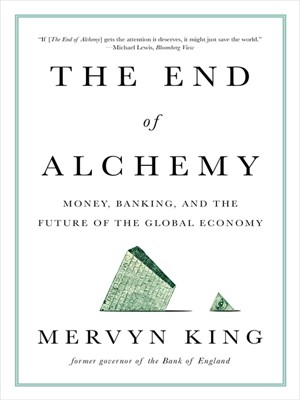
“If [ The End of Alchemy ] gets the attention it deserves, it might just save the world.” ―Michael Lewis, Bloomberg View Something is wrong with our banking system. We all sense that, but Mervyn King knows it firsthand; his ten years at the helm of the Bank of England, including at the height of the financial crisis, revealed profound truths about the mechanisms of our capitalist society. In The End of Alchemy he offers us an essential work about the history and future of money and banking, the keys to modern finance. The Industrial Revolution built the foundation of our modern capitalist age. Yet the flowering of technological innovations during that dynamic period relied on the widespread adoption of two much older ideas: the creation of paper money and the invention of banks that issued credit. We take these systems for granted today, yet at their core both ideas were revolutionary and almost magical. Common paper became as precious as gold, and risky long-term loans were transformed into safe short-term bank deposits. As King argues, this is financial alchemy―the creation of extraordinary financial powers that defy reality and common sense. Faith in these powers has led to huge benefits; the liquidity they create has fueled economic growth for two centuries now. However, they have also produced an unending string of economic disasters, from hyperinflations to banking collapses to the recent global recession and current stagnation. How do we reconcile the potent strengths of these ideas with their inherent weaknesses? King draws on his unique experience to present fresh interpretations of these economic forces and to point the way forward for the global economy. His bold solutions cut through current overstuffed and needlessly complex legislation to provide a clear path to durable prosperity and the end of overreliance on the alchemy of our financial ancestors.
Hvorfor peker de økonomiske pilene nedover i Norge? I 2013 hadde vi den beste kombinasjonen av velstand, helse og lykke i verden. Så ble vekst . . .
Scandinavian countries have been praised for their high levels of welfare provision and their economic and social outcomes. It is true that they are successful . . .
From world-renowned economist Paul Collier, a candid diagnosis of the failures of capitalism and a pragmatic and realistic vision for how we can repair it. . . .
Dette er en veldig oppklarende bok og det er ikke vanskelig å se for seg at andre som snakker fornuftig om økonomi, geografi, historie og . . .
Thing 1: There is no such thing as free market.Thing 4: The washing machine has changed the world more than the Internet.Thing 5: Assume the . . .
Brilliant and engagingly written, Why Nations Fail answers the question that has stumped the experts for centuries: Why are some nations rich and others poor, . . .
In this highly readable and thought-provoking work, Nick Dyer-Witheford assesses the relevance of Marxism in our time and demonstrates how the information age, far from . . .
We are well aware of the rise of the 1% as the rapid growth of economic inequality has put the majority of the world’s wealth . . .
Thomas Pikettys bog «Kapitalen i det 21. århundrede» handler om økonomi, kapitalisme, ulighed, meritokrati og demokrati. Med «Kapitalen i det 21. århundrede» har Thomas Piketty . . .